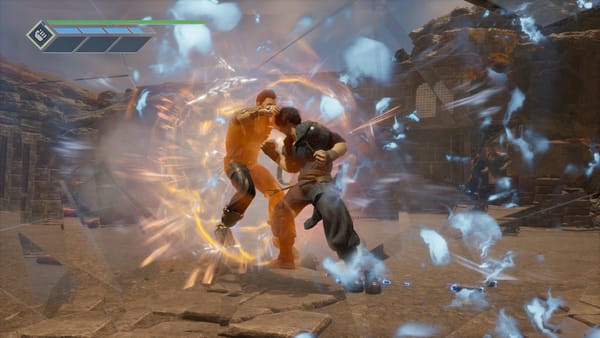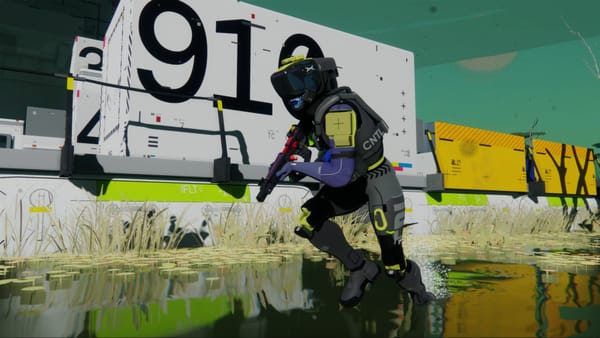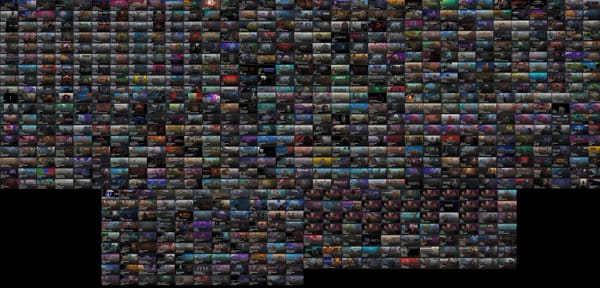#38: ...in Pog form
Earlier this week, on a call with someone with a passing, and potentially professional, interest in the games business, I was asked what trends I saw emerging in games today. It was only after we said our goodbyes and hung up that I realised I’d forgotten the biggest one of all. Sure, we can debate the future of free-to-play and battle royales (battles royale?), of VR and AR, of blockchain games and the metaverse and all the rest of the VC buzzwords. But nothing in games is so eternally marketable, so guaranteed to succeed, as to trade in player nostalgia.
No other industry has proven itself so adept at selling people things they already own, over and over again. I wrote about this in an early edition of Hit Points where, full of the naive excitement of the run-up to not-E3, I lamented the extent to which today’s game industry was being defined by yesterday’s games. Yet perhaps I wasn’t being entirely honest with myself. This stuff is successful for a reason, and if I am even to call it a problem then I must acknowledge that I am a part of it.
I know I ought to roll my eyes at yesterday’s report that Rockstar is to release a remastered collection of Grand Theft Autos (Grand Thefts Auto? Gah) III, Vice City and San Andreas, but I am delighted by it. I will absolutely buy GTAV, a game I already own on at least three platforms (I’ve honestly lost count), when it is tarted up for new consoles this winter. And there is no game I am looking forward to more this year than Super Monkey Ball: Banana Mania, purely because it promises to reunite me with the exceptional minigame Monkey Target, provider of many treasured local-multiplayer memories.
Obviously this is in large part down to technology. Historically, buying a new console has meant consigning your old one, and all the games you bought and loved, to history. As soon as the new machine is hooked up I feel like a switch has been flicked in my brain, and an entire generation’s worth of games are now ‘old’. Over time, those games come to look worse, to have less refined controls, to be harder to want to go back to.
And if you’ve bought a new TV, you may not be able to revisit them anyway. When I showed my son the Banana Mania trailer, he asked if we could play the GameCube original that’s on display in my home office (with apologies for the flex, I had Toshihiro Nagoshi sign it when I interviewed him in Japan a few years ago). While I still have my GameCube and all the original cables, my TV doesn’t have a SCART socket. That was a fun thing to try and explain to a seven-year-old. He hasn’t looked that confused since the time I explained how double-elimination fighting-game tournament brackets work.
This is what it means to spend a lifetime playing games: all those cherished memories, those eternal emotional bonds, rendered ancient if not obsolete by technology’s inexorable forward march. The game industry has always been terrible at preserving its history, and while a long-overdue focus on compatibility, particularly on Xbox, has helped address that somewhat, the remasters and remakes — not to mention the (sarcastic airquotes klaxon) ‘spiritual successors’ — are if anything more prevalent, and more commercially successful, than ever. I realise I’m part of the problem here, and if that upsets you I can only apologise. Once you get to my age, any opportunity to be transported back to one’s youth is eagerly grasped by gnarled, calloused old hands.
MORE!
- The US Senate is to consider legislation that might make Epic’s legal life a bit easier: the Open App Markets Act would ban app stores from forcing developers to use provider payment systems. Epic probably isn’t getting too excited, mind you. This is the Senate, after all, so the bill will likely spend the next 300 years in committee, then be filibustered into oblivion the moment it hits the floor.
- Unity Technologies posted a loss of almost $150 million last quarter, but that hasn’t stopped it dropping $320 million on the acquisition of desktop streaming service Parsec. Stuff like this makes running a business sound incredibly easy, eh.
- Meanwhile, Nexon has missed its own profit forecast, thanks to a decline in value of the $100 million worth of Bitcoin it bought in April. There’s a lesson in there somewhere.
- The ‘Game Pass on Switch’ thing that industry insiders have been whispering about for a couple of years finally appears to be dead, according to affable indie-game t-shirt model Phil Spencer — though not for lack of trying, by the sounds of it. “We have no plans to bring it to any other kind of closed platforms right now,” he says, “mainly because those closed platforms don’t want something like Game Pass.”
- Nor do they need it. Over in Japan, the entire top 30 is comprised of Switch games — the first time a single platform has dominated the software charts in 33 years, back when all this were fields.
- Cory Davis, creative director of the excellent Spec Ops: The Line, has started a new studio with Nine Inch Nails guitarist Robin Finck. Based in LA, Eyes Out’s first project is described as an “immersive cosmic horror game”.
- Twitch acknowledges that it “needs to do more” to combat harassment. A start, I suppose.
- The CEO and COO of Glu Mobile, the publisher acquired by EA recently for $2.1 billion, are swanning off into the sunset at the end of August. Bit weird, this, given that leadership tends to stick around for a while after a buyout — and even more so given that the top bods at Codemasters, another recent EA acquisition, have done the same.
That’s it for today, and indeed the week. Behold the below buttons, interact with them if you’re so minded, and have an excellent weekend. Cheerio!





